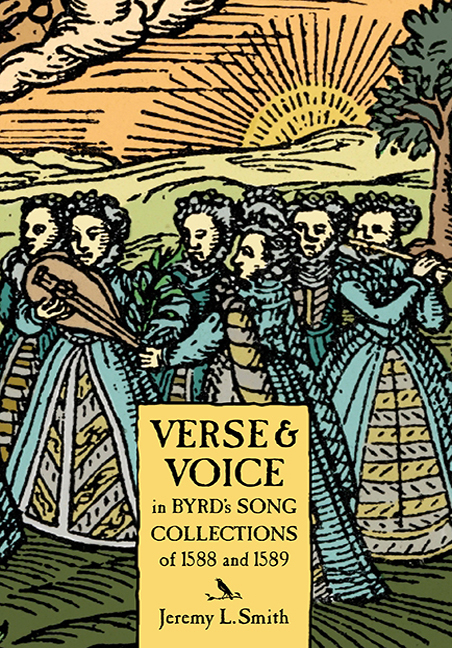Book contents
- Frontmatter
- Contents
- List of Figures
- List of Music Examples
- Preface and Acknowledgements
- Editorial Conventions
- Introduction
- CHAPTER 1 Psalmes
- CHAPTER 2 Sonets & Pastoralls, I
- CHAPTER 3 Sonets & Pastoralls, II
- CHAPTER 4 Sonets & Pastoralls, III
- CHAPTER 5 Songs of sadnes and pietie
- CHAPTER 6 Songs of Three Parts
- CHAPTER 7 Songs of Four Parts
- CHAPTER 8 Songs of Five Parts
- CHAPTER 9 Songs of Six Parts
- Conclusion
- Select Bibliography
- Index
- Studies in Medieval and Renaissance Music
CHAPTER 4 - Sonets & Pastoralls, III
Published online by Cambridge University Press: 05 July 2016
- Frontmatter
- Contents
- List of Figures
- List of Music Examples
- Preface and Acknowledgements
- Editorial Conventions
- Introduction
- CHAPTER 1 Psalmes
- CHAPTER 2 Sonets & Pastoralls, I
- CHAPTER 3 Sonets & Pastoralls, II
- CHAPTER 4 Sonets & Pastoralls, III
- CHAPTER 5 Songs of sadnes and pietie
- CHAPTER 6 Songs of Three Parts
- CHAPTER 7 Songs of Four Parts
- CHAPTER 8 Songs of Five Parts
- CHAPTER 9 Songs of Six Parts
- Conclusion
- Select Bibliography
- Index
- Studies in Medieval and Renaissance Music
Summary
IT is not uniquely postmodernist to contend that women can be magnificent and men can be chaste. Elizabethans believed this as well. The character Marinell of the Faerie Queene, who avoids love out of fear, represents, for example, a virginal chaste man in Edmund Spenser's epic poem. Elizabeth Talbot, aka Bess of Hardwick, commissioned a full set of tapestries depicting women who exemplified a number of virtues. In his epitaph for Mary Queen of Scots, which was mounted on her tomb, the Byrd patron Henry Howard, first Earl of Northampton, championed his subject above all for her magnanimity and chastised her (presumably male and female) enemies for their pusillanimity.
Despite these models, Byrd's approach to the virtues is starkly gender-specific. Women play pivotal roles in poems that appear before “Constant Penelope” (BE 12: 23) in the book, but only as objects guiding men toward or away from the right view of a virtue. In this last quartet of the middle section of the Psalmes women finally become the focus of interest, and, for the spell of two songs, the primary subject matter as well.
There can be no question that “Constant Penelope” concerns marital chastity from a female perspective. Cleverly remaining faithful to an absent Ulysses in the face of many obstacles and for an extraordinarily long period, Penelope was the most well-known example of the virtue. Likewise “La virginella” (BE 12: 24) elegantly depicts an unambiguously feminine virginity. But “Farewell false love” (BE 12: 25) and “The match that's made” (BE 12: 26) seem neither exclusively about women nor directed exclusively toward a female audience. The feminine virtue of chastity introduced by the first two works is by no means unimportant, but it shares the stage with another theme of similar consequence in the quartet, namely marriage.
As with the other sets, these songs point to a particular view about a well-known virtue, in this case chastity, presenting excesses and deficiencies that help lead the reader to the appropriate mean. All but “Farewell,” however, concern matrimony as well.
- Type
- Chapter
- Information
- Verse and Voice in Byrd's Song Collections of 1588 and 1589 , pp. 91 - 106Publisher: Boydell & BrewerPrint publication year: 2016

